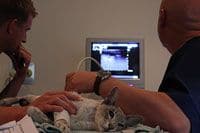Scarlett’s Struggle for Survival
Cocker Spaniel Scarlett arrived at Perth Vet Emergency with evidence of tetanus, after her owners noticed Scarlett wasn’t her usual self – her facial muscles were stiff and she was having difficulty drinking. The team quickly rushed her through to conduct a thorough examination of her condition.
Treatment
The beautiful three-year-old Scarlett continued to remain stable for a few days after admission, and so it was thought she was ready to go home, back to her family. However, her recovery was sadly disrupted as she began to have significant muscle spasms, requiring additional medication to provide muscle relaxation to the poorly pooch. Scarlett began to develop a slow heart rate, often occurring when the toxin begins to affect the neurological system. Nurses closely monitored her heart rate around the clock to ensure that she remained stable.
The team continued to treat signs of tetanus, as Scarlett showed little improvement the following week. Multiple medications were needed to keep her sedated and to provide muscle relaxation and pain relief. The PVE team stayed by her side to make her feel comfortable, slowly nursing her back to health. After ten long and stressful days following her unfortunate admission, she eventually started showing improvement. Slowly over the next few days, she was able to be weaned off her medications – the PVE team were ecstatic to see her up and walking again, and she finally started to eat.
Due to the severity of Scarlett’s condition, every staff member was involved in all aspects of her care, and to be able to send her home to her relieved family was a huge achievement for the team. We are happy to report Scarlett is back to her beautiful self relaxing and playing on the beach.
Tetanus
Tetanus is a disease that affects mammals and results in neurological dysfunction. It is caused by a toxin produced by bacteria. Tetanus infection in cats and dogs is commonly associated with open wounds and occurs about 5-10 days after exposure to the toxin.
Dogs and cats are thought to be innately resistant (200 and 2400 times more so than humans) to tetanus infection. However, if infected, nerves to the skeletal muscle are blocked which results in muscle spasms. Recovery following tetanus infection requires new nerve receptors to grow which takes approximately three weeks. If your pet needs wound treatment, please contact your local vet or Perth Vet Emergency.




